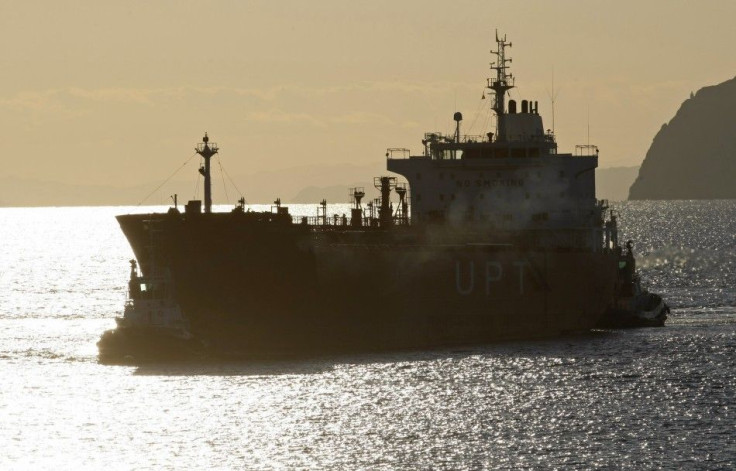World's Shippers Struggling to Stay Afloat Amid Credit Crunch
Equity Selloffs, High-Seas Vessel 'Arrests' in View

They're gonna need a smaller boat.
After building up their fleets to unsustainable sizes during the boom of a few years ago, international shippers are seeing balance sheets sink into a sea of red ink, running ships at a loss to prevent their companies from rusting into oblivion. And now, sensing blood in the water, banks are turning off the money spigot, hoping to take a bite of healthy companies' equity, say analysts who cover the industry.
Funding is very, very dry, so for many companies it's going to be a very tough year. We are calling this a crisis for 2012, Andrew Broomhead, financial chief at Hong Kong's biggest operator of dry-bulk vessels, Pacific Basin Shipping Ltd., said Friday on CNBC.
The reason for the crisis: too many ships, not enough cargo. Shippers are being forced to take delivery of fleets they ordered during the boom that ended with the 2008 global financial crisis. And while demand is there, there's just too much supply. As a result, shipping charges on some routes have fallen to levels that make it unprofitable to operate a vessel, with brokers now sometimes leasing out their ships just to prevent them from rusting idly in port.
Fundamentally speaking, rates are now below the operating cost of the vessels, which they can't be for a very long time, Frode Mørkedal, an Oslo-based shipping analyst for shipping-focused investment bank RS Platou Markets, said in a recent interview.
Indeed, the Baltic Dry Index, which serves as a benchmark the cost of shipping cargo around the world, is near historical lows, down 64.9 percent since last October after hitting an all-time low Feb. 6.
The Sharks Circle
No one believes the world's shipping industry will go under: Global commerce still requires shipping a variety goods and commodities from one corner of the planet to another. But in a market with excessive supply, the bet is that some companies, including big ones, will sink.
As a result, banks that usually provide financing are turning away old customers, minimizing exposure to the now-erratic sector. The cash gap, analysts say, will have to be filled using other means, perhaps even requiring shippers to surrender some equity.
The chief of the shipping unit at Nordea AS, a key lender to the industry, told a conference in Stockholm in February that banks would be cutting back on how much money they pump into the shipping sector.
I think you will see that a lot more capacity for ship finance in the next two or three years will have to come from either export credit agencies, shipbuilding nations -- but also from other capital sources, especially from the bond market, and also from private equity and other equity sources, Hans Christian Kjelsrud was quoted as saying by Reuters.
Already, companies unable to tap into those sources are sending out an SOS.
Last week, Indonesia's Berlian Laju Tanker, the country's largest oil and gas shipping group, defaulted on $2 billion worth of promissory notes. Danish tanker giant Torm is asking for an extension on its repayment of $1.87 billion, Reuters reported.
Already there is talk of banks preparing to arrest ships from companies in default, a drastic step, sometimes involving private paramilitary forces, taken when a bank forecloses on a maritime firm and seizes its vessels as collateral.
A third alternative to default or restructuring is selling off a part of the shipping company. An analyst at an Oslo-based bank, who asked to remain anonymous so as to not harm relationships with clients, said many companies might be forced to follow the example of U.S.-based Genco Shipping and Trading, which last week surprised the market by announcing it would be selling off equity -- and thus diluting current shareholders -- through a $50 million stock offering.
Companies have problems, the analyst said. They made decisions when ship markets were at peak and the burden associated with those acquisitions is hard to live up to.
The analyst added that although some companies are positioned to thrive following the turmoil, doing so will be a matter of selling to investors that you do have a life after the crisis.
If you have an old fleet, you may not live through another period to one of good earnings. At some point, all ships end up as nail and screws.
© Copyright IBTimes 2024. All rights reserved.











